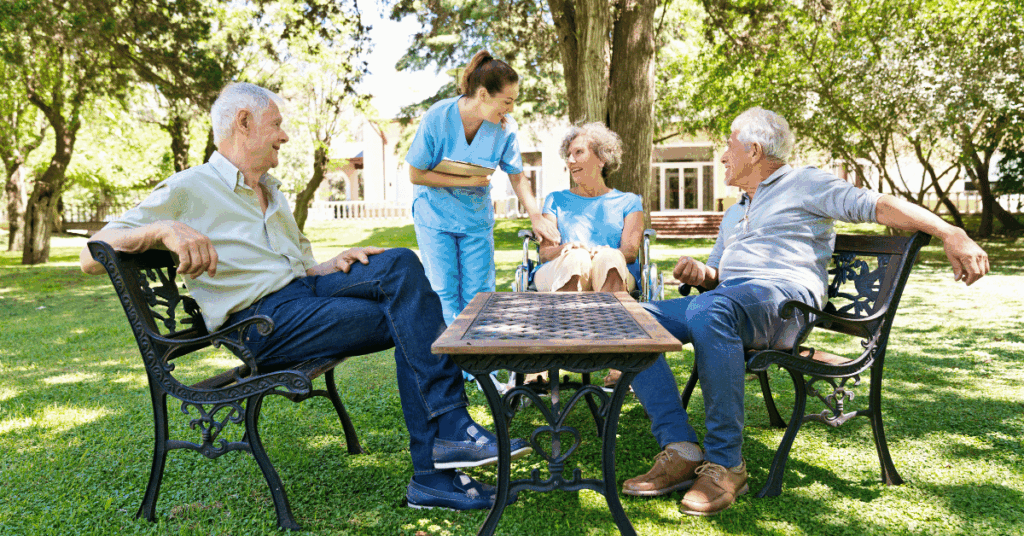Summer brings with it the promise of warmth, sunshine, and time spent outdoors. For individuals living with dementia, the hotter months can also bring added risks. Rising temperatures, prolonged sun exposure, and shifting routines can affect comfort, health, and behaviour in unexpected ways.
Helping someone with dementia stay cool and feel comfortable during the summer requires both planning and paying attention. From choosing the right clothing to ensuring adequate hydration, small adjustments can make a big difference in how someone experiences the season.
Why Close Observation Matters in the Summer
People living with dementia may not recognise or communicate that they are too hot, dehydrated, or uncomfortable—even if the signs are clear to others. It’s not uncommon for someone with dementia to wear heavy clothing in the heat, such as wool sweaters or fleece jackets, even when they are visibly sweating. This isn’t stubbornness—it’s often due to changes in sensory perception, memory, or impaired judgement caused by dementia.
Dementia can significantly affect the body’s ability to regulate temperature, largely due to damage in the hypothalamus—the part of the brain responsible for maintaining internal temperature balance in response to environmental changes. Additionally, the body’s automatic responses to temperature shifts, such as sweating in the heat or shivering in the cold, may become less effective or even absent. This diminished capacity to respond to temperature changes can increase the risk of overheating during warm weather and make daily life more challenging for those living with dementia.
Overheating and dehydration can escalate quickly into confusion, falls, heat exhaustion, or even heat stroke. That’s why careful observation is key—looking for visual cues like flushed skin, increased agitation, sweating, or excessive fatigue can help you intervene early.
Dressing for Comfort and Confidence
Clothing may seem like a small detail, but for someone living with dementia, the right outfit can make a big difference in comfort, mood, and dignity—especially in the summer. Lightweight, breathable fabrics like cotton and linen help keep the body cool, while light colours reflect heat and can brighten one’s mood.
In care homes, families can support their loved ones by asking staff whether the person has suitable summer clothing that still fits, including lighter pyjamas, soft sun hats, or thinner blankets for warmer nights.
Avoiding heavy layers and opting for easy-to-wear items—like those with Velcro, elastic waistbands, or simple front fasteners—can help maintain a sense of independence.
With a little planning, getting dressed can become a reassuring routine that supports both physical comfort and emotional well-being.
Bathing is More Than Just About Staying Clean
As temperatures rise, so does the body’s natural response to heat—sweating. For people living with dementia, who may already be less able to communicate discomfort or recognise the need to bathe, this can lead to challenges that go unnoticed. Sweat can build up in skin folds, under clothing, or on bed linens, increasing the risk of skin irritation, rashes, and infections if not properly managed.
It can also lead to unpleasant body odour, which the person may not notice—or may be too embarrassed to mention.
That’s why regular bathing becomes especially important in the summer. It not only helps maintain skin integrity but also promotes comfort, dignity, and overall well-being. Even if someone doesn’t express the need for a bath or shower, that doesn’t mean it’s not needed. Dementia can affect a person’s sense of smell or awareness of hygiene, making gentle prompting and routine all the more essential.
Caregivers can support this by making the bathing experience soothing and non-threatening. Using soft cloths, warm (but not hot) water, and speaking reassuringly throughout can ease anxiety.
For those in care homes, families can ask how often bathing occurs, and whether skincare routines—like moisturising and checking for signs of irritation—are part of the daily schedule.
In the heat of summer, a fresh bath isn’t just about hygiene—it’s about helping someone feel comfortable in their skin.
Hydration is Health
Many people living with dementia do not feel thirsty in the same way others do. They may forget to drink, or they may avoid liquids if they associate them with incontinence. But hydration is key to physical health, mental clarity, and emotional balance—especially in the heat. In the hot summer months, when changed behaviours are observed, consider delirium triggered by dehydration.
It’s important to encourage small, frequent sips throughout the day. Water is best, but you can get creative by offering diluted fruit juices, herbal teas, or even hydrating snacks like watermelon, cucumber slices, and yoghurt. Flavouring water with a slice of lemon, lime, or a sprig of mint can also make it more appealing.
Use visual cues to help prompt regular drinking. Brightly coloured cups, easy-to-hold mugs, or even a shared hydration routine—“Let’s both have a drink”—can serve as gentle reminders.
Watch closely for signs of dehydration: dry mouth, darker urine, low energy, confusion, or increased irritability. These signs can be subtle, but they matter.
With a bit of forethought and sensitivity, summer doesn’t have to be a season of struggle. Instead, it can be filled with meaningful moments—an afternoon in the shade, the coolness of a breeze through open windows, or a shared popsicle on the porch.
Supporting people with dementia through the summer isn’t just about managing risks—it’s about helping them continue to enjoy life’s simple pleasures, safely and comfortably.
Because everyone deserves a summer that feels good.
At Dementia Solutions, we are here to walk beside you every step of the way. We provide the tools, knowledge, and support to help you feel empowered in your caregiving role, so you can offer the best care possible and find strength and peace within yourself as you do.
At Dementia Solutions, we’ve made it our mission to demystify dementia behaviour and continue to explore person-centred, creative, non-pharmacological solutions to manage dementia-related behaviours. We believe that awareness creation and skill-building through education is the most effective and powerful tool we have to promote and maintain the well-being of both the person with dementia and their caregiver.
If you’re a professional caregiver, consider becoming a Certified Dementia Care Provider!
Ready to deepen your understanding and be confident in your skills in managing changed behaviours due to dementia? Register for our Certified Dementia Care Provider program today and learn how to communicate with compassion, navigate challenging behaviours, and provide the best care for individuals living with dementia. Gain the tools you need to make a meaningful difference in the lives of those you care for. Sign up now and start transforming your caregiving approach!
If you’re a Family Caregiver, we invite you to join our Dementia Solutions Family Membership!
As a family caregiver, you don’t have to navigate the challenges of dementia alone. Join our Dementia Solutions Family Membership today and gain access to expert guidance, practical tips, and a supportive community of caregivers just like you. With resources, real stories, and valuable tools, we’re here to help you provide the best care while maintaining your well-being. Sign up now and take the next step toward confident, compassionate caregiving!
Any questions, simply send us an email at Info@DementiaSolutions.ca , and we’ll guide you through everything our programs have to offer. We look forward to helping you take the next step in your caregiving journey!
If you need support in your caregiving experience or would like to learn more about our educational opportunities, please reach out to us at Info@DementiaSolutions.ca and we would be more than happy to support you.
DISCLAIMER:
The contents of this blog are provided for information purposes only. They are not intended to replace clinical diagnosis or medical advice from a health professional.



